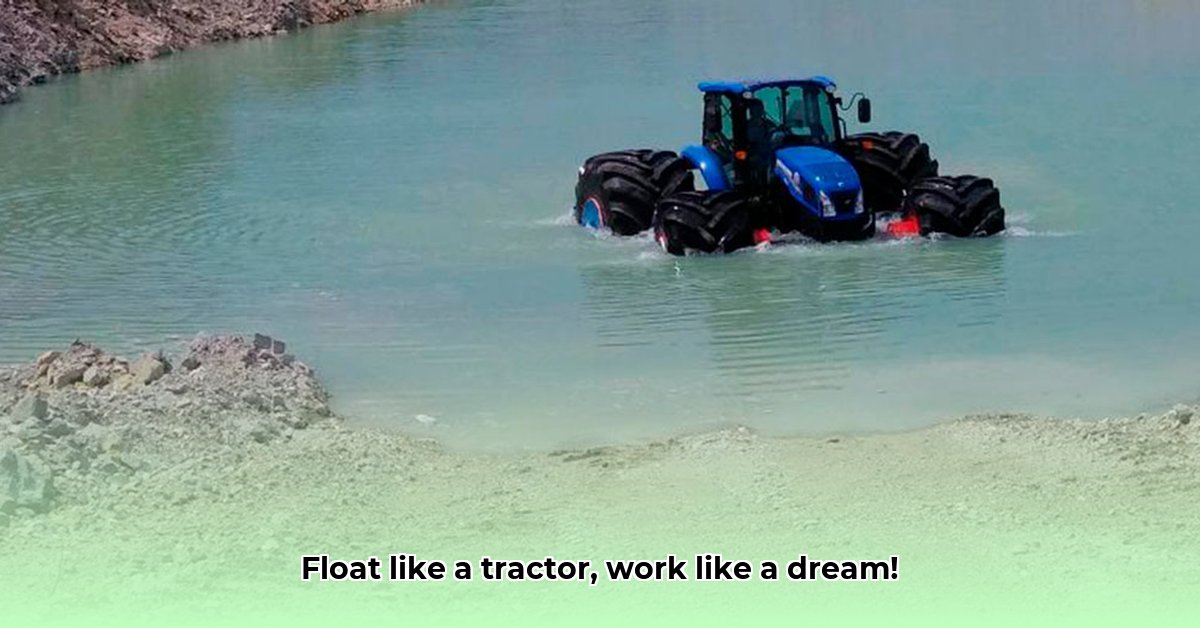
Floating Tractor: A Revolution in Soil Health?
The Farm Progress Show recently showcased a truly remarkable sight: a tractor seemingly floating above the ground. This wasn't a magic trick, but a powerful demonstration of how advanced tire technology can dramatically reduce soil compaction, a significant challenge facing modern agriculture. This innovative approach, using Very High Flotation (VF) tires, promises significant benefits for farmers and the future of sustainable agriculture. For more on tractor technology, check out this resource.
The "Floating" Effect: Understanding VF Tires
The secret behind the floating tractor lies in its tires. These aren't your average tractor tires; they're significantly larger Very High Flotation (VF) tires designed to distribute the tractor's weight over a much wider area. Instead of concentrating pressure on a small point, the VF tires distribute it more evenly like a giant air mattress, minimizing the impact on the soil. This drastically reduces soil compaction, a major contributor to decreased crop yields. The demonstration was a compelling visual representation of this technology's potential.
Soil Compaction: A Silent Threat to Crop Yields
Soil compaction is a silent thief, gradually compromising soil health. The compression of soil particles reduces pore space, hindering water infiltration, root penetration, and ultimately, crop yields. This leads to decreased water and nutrient uptake by plants causing stress and reduced productivity. Heavy machinery is a primary culprit, contributing to compaction and long-term soil degradation.
VF Tires: A Practical Solution for Soil Conservation?
The floating tractor demonstration, while visually striking, highlights the already-available technology behind it: VF tires. These tires, being commercially available, offer a practical method for mitigating soil compaction. The key is selecting appropriate tires for specific soil types and farming practices, as there isn't a one-size-fits-all solution.
The Benefits for Farmers: Increased Yields and Reduced Costs
Reducing soil compaction with VF tires promises notable advantages for farmers:
Improved Soil Health: Less compaction means better water infiltration, enhanced aeration, and stronger root systems, leading to healthier soils overall.
Higher Crop Yields: Healthier soils translate directly into more robust and productive plants, potentially leading to substantially increased harvests and farm profitability.
Lower Fuel Consumption: Reduced soil resistance means tractors require less power to operate, leading to potential savings in fuel costs.
The Future of Soil-Saving Technology: Ongoing Research and Development
While the floating tractor grabbed headlines, its true impact remains to be fully quantified. Further research is crucial to comprehensively assess the long-term effects on soil structure, nutrient cycling, and to definitively determine the economic returns on investment. We anticipate increased integration of precision agriculture techniques, utilizing sensors to dynamically adjust tire pressure based on real-time soil conditions. This "smart tire" concept promises optimized soil health management.
Challenges and Opportunities: Navigating the Path Forward
Despite the exciting prospects, challenges remain:
Higher Initial Cost: VF tires typically command a higher price tag than standard tires, representing a significant upfront investment.
Limited Availability: The current selection of VF tires might not always meet the diverse needs of all farmers and farming operations.
Need for Further Research: More extensive research is necessary to confirm the long-term profitability and sustainability of VF tire technology across various soil types and operating conditions.
A Call to Action: Collaboration for Sustainable Agriculture
The floating tractor serves as a powerful symbol of innovation. However, its full potential relies on widespread adoption of the underlying VF tire technology. This requires a collaborative effort:
Farmers: Explore the suitability of VF tires for your farming practices and consider transitioning gradually, beginning with small-scale trials.
Tire Manufacturers: Invest in research and development to enhance VF tire designs, incorporating more sustainable materials.
Agricultural Researchers: Conduct rigorous field tests to precisely quantify the long-term effects on yield and soil health.
Government Agencies: Offer financial incentives and support to promote sustainable farming practices, including the adoption of VF tire technology.
Actionable Steps: A Roadmap for Implementation
| Stakeholder Group | Short-Term Actions | Long-Term Goals |
|---|---|---|
| Farmers | Evaluate the suitability of VF tires, conduct small-scale trials. | Integrate precision agriculture technologies, implementing dynamic tire pressure adjustment. |
| Tire Manufacturers | Improve VF tire designs; prioritize sustainable material sourcing. | Develop "smart tires" with integrated sensors for real-time adjustments. |
| Agricultural Researchers | Perform comprehensive field trials to measure yield & soil health impact. | Create predictive models for optimal tire selection and pressure management. |
| Government Agencies | Provide subsidies and incentives for the adoption of sustainable practices. | Fund research into advanced tire technologies and farming methods. |
The floating tractor vividly illustrates the potential of innovative technology. By working together, we can ensure this technology contributes to a more sustainable and efficient agricultural future. This proactive approach will leverage VF tires to enhance soil health and improve crop yields, benefiting both farmers and the environment.